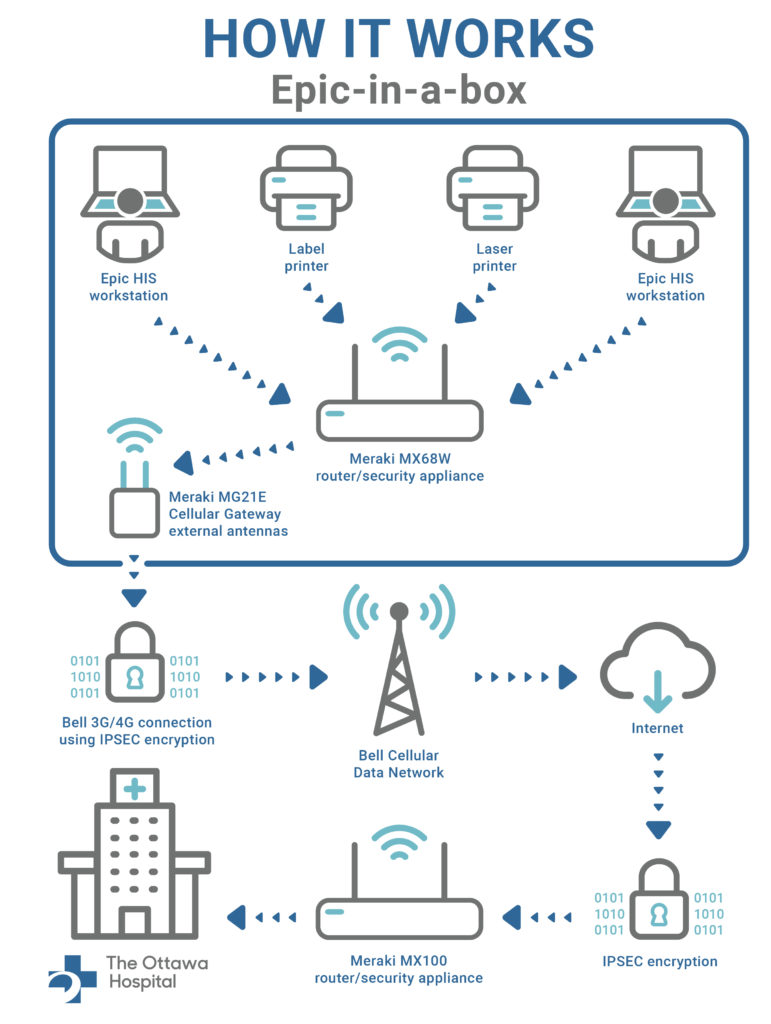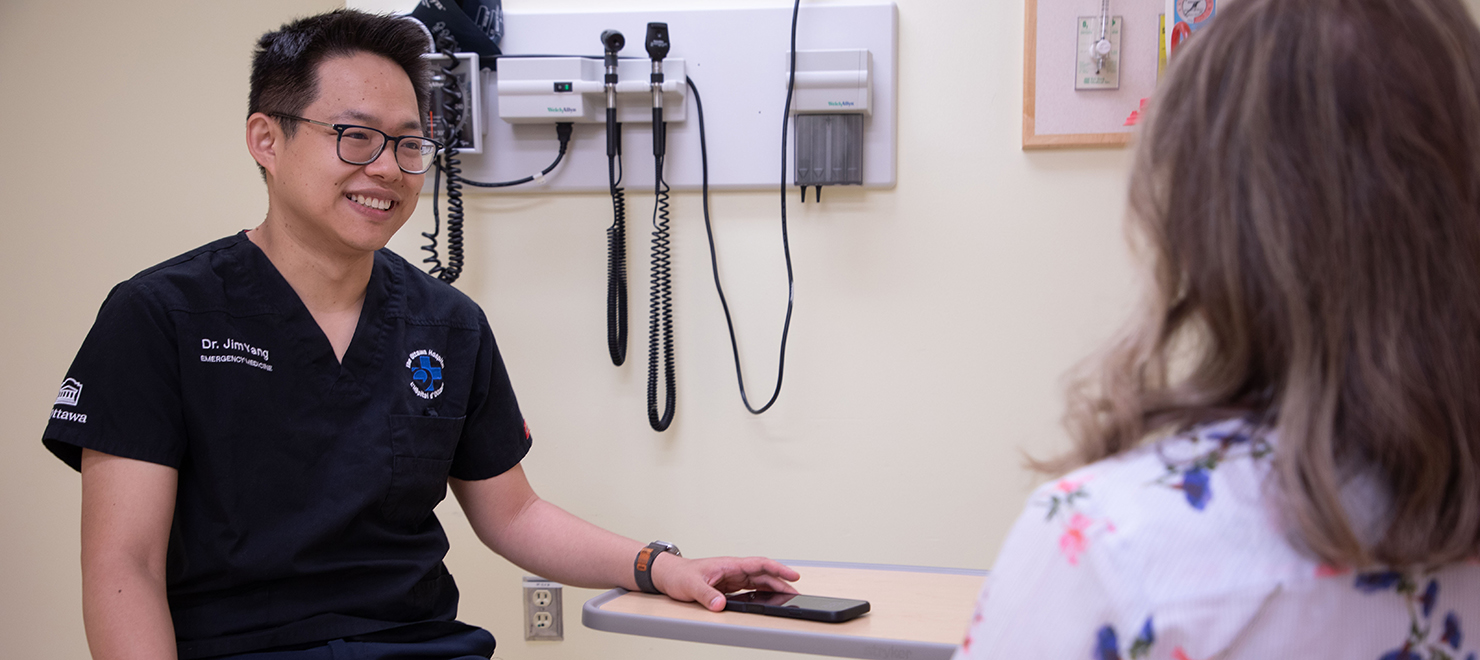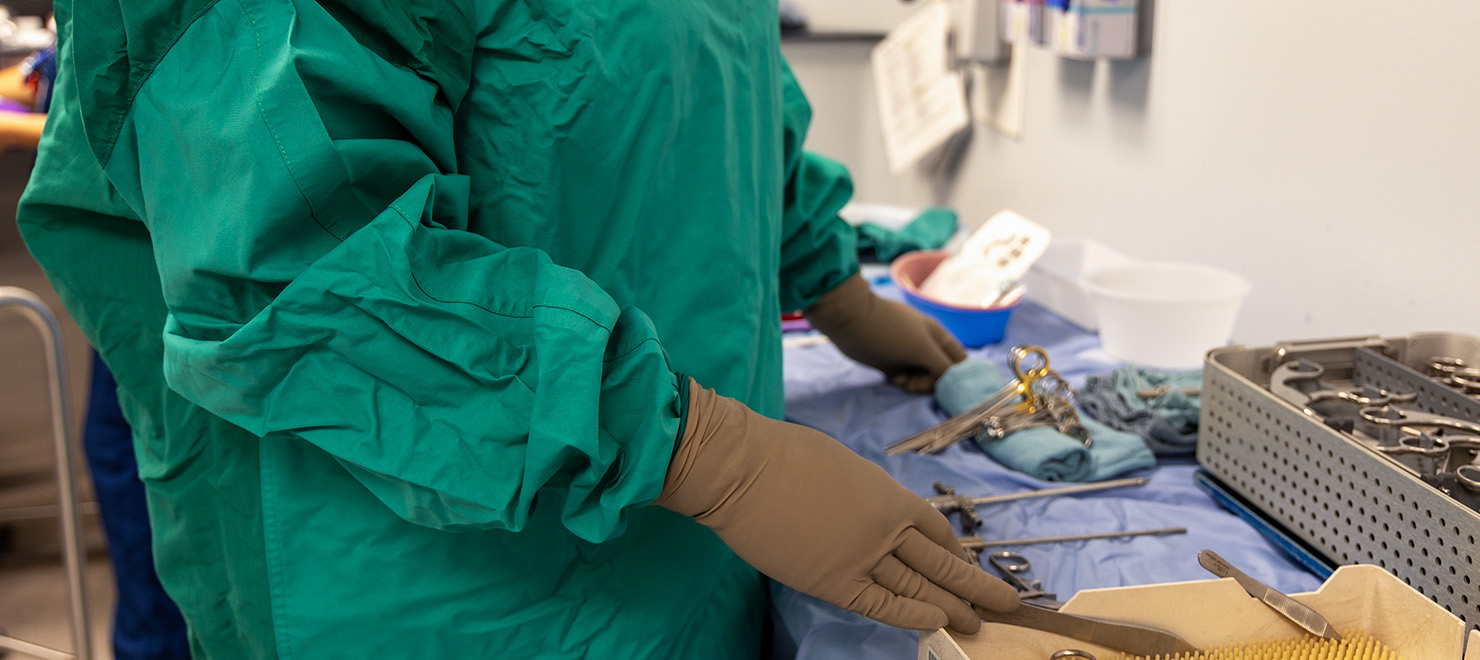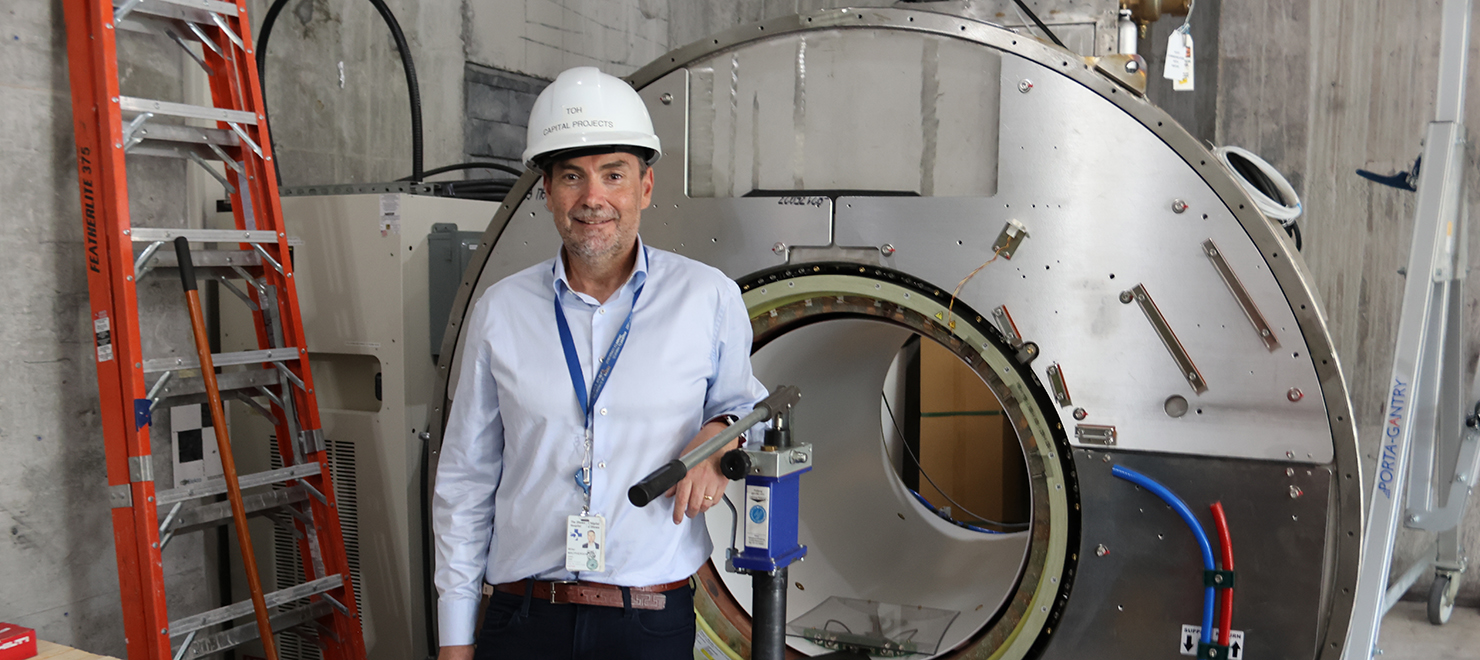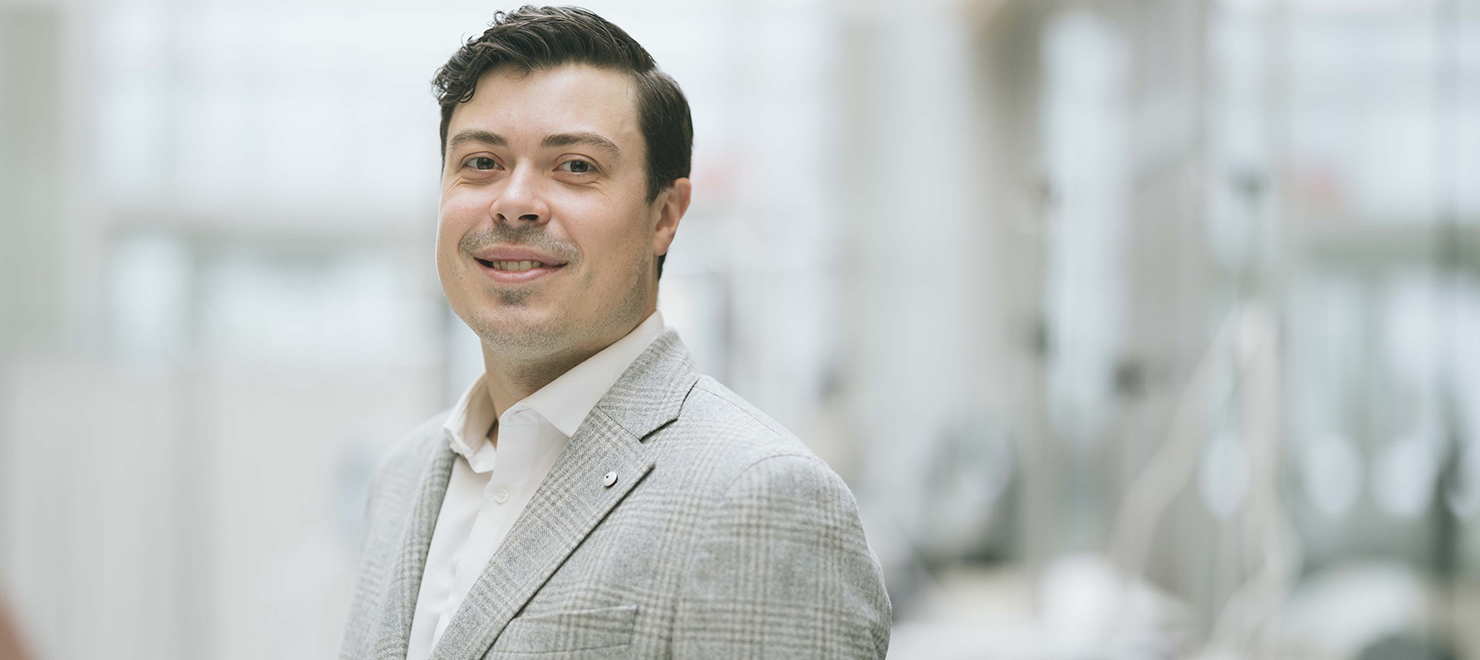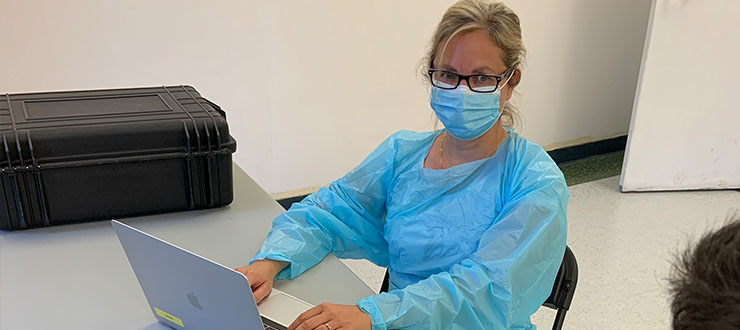
Marie-Pierre Trempe, Registered Nurse at the COVID-19 Assessment Centre uses Epic-in-a-box to register patients in Epic – something that was only possible in hospital, until now.
Massive. That’s one way to describe the capabilities of Epic, The Ottawa Hospital’s digital health record. Since its launch on June 1, 2019 at The Ottawa Hospital and six regional health partners, everything from COVID-19 tests to x-rays to brain scans for hundreds of thousands of patients in the region have been fully digitized in the Epic system, bringing patient-centred care into the digital age.
And now, those massive capabilities that were originally only available in hospital have been shrunk to fit in a space no larger than a briefcase.
“The theory behind Epic-in-a-box was to open the box, open a laptop, plug in a password and not have to depend on a wireless network, or any other infrastructure, but be able to use full Epic functionality,” said John Trickett, Director at The Ottawa Hospital.
In other words, Epic-in-a-box is an innovation that makes the power of Epic portable – and that translates to even more benefits for patients.
“As long as you have power, you can open the box and away you go.”
One of the biggest benefits for patients is convenience. For example, Epic-in-a-box has been used in long-term care homes where residents and staff were being tested for COVID-19.
“It means that those residents don’t have to travel to the hospital or the COVID-19 Assessment Centre to get a test,” said Rosemary Bickerton, Site Lead for the COVID-19 Assessment Centre at the Brewer Arena. “We can do exactly the same thing out of that box as we could do for you at Brewer.”
Health-care professionals who use Epic-in-a-box will be able to meet patients in their home or another location, register new patients in the Epic system, and be able to see their chart, order tests and use Epic as if they were at the hospital.
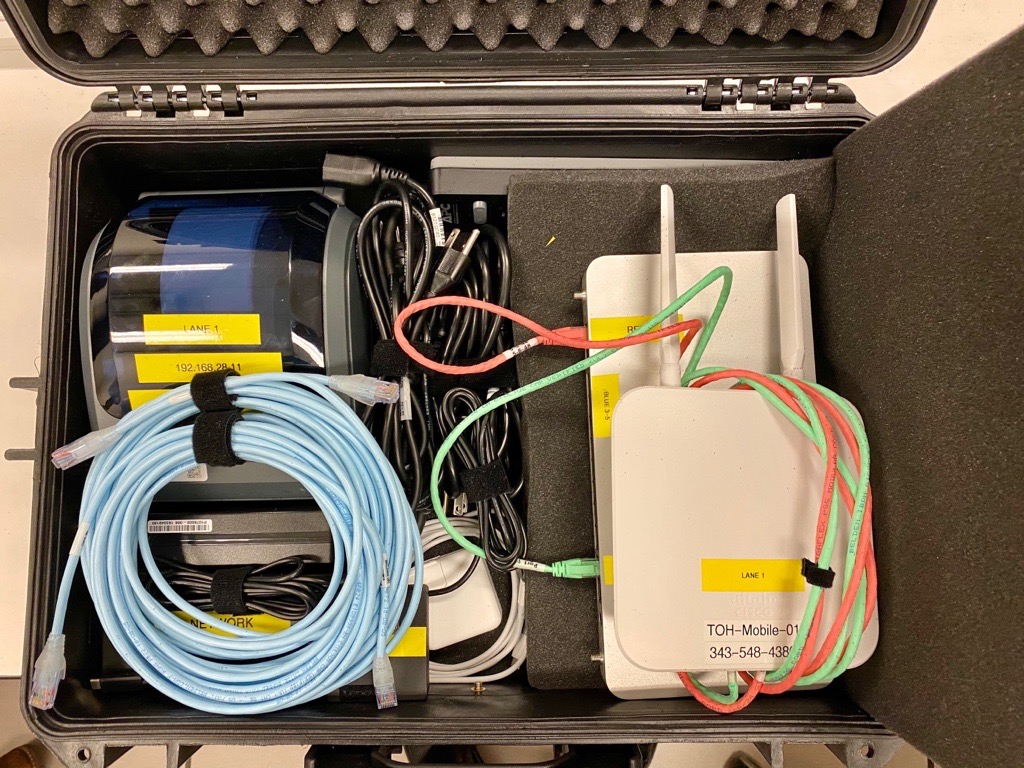
Since Epic-in-a-box is also fully integrated with MyChart, Epic’s patient portal, patients who have a MyChart account can receive their results securely on their laptop, tablet or smartphone as soon as they are available.
Unlike Epic in the hospital that requires a lot of infrastructure, Epic-in-a-box uses the same kind of technology as your cell phone, only much more secure.
“Cisco Meraki is a solution that allows us to make a network mobile,” said Jim Makris, Manager of Network Services at The Ottawa Hospital. “It works off of the LTE network, so it works off a SIM just like a phone system. There’s no reliance on infrastructure required at any of the remote sites. All you need is power. You plug it in and it automatically makes a secure connection back to the hospital and provides connectivity for end devices.”
“It essentially creates a satellite unit outside the hospital with full hospital access,” said Stephen Roos, Manager of Client Services. “As long as you have power, you can open the box and away you go.”
The system has numerous security and privacy measures built in. All users must input their Epic credentials in order to access the system. The Cisco Meraki device provides full 256-bit encryption to The Ottawa Hospital over a fully-secure IPSec tunnel. Should the box be stolen or lost, the hospital can disable its connectivity. Moreover, no patient data is stored in the box itself; all patient data is securely stored in Epic, which contains its own robust security and privacy systems and protocols.
In the future, Epic-in-a-box could be used in many other environments, including remote communities in Nunavut, in a pop-up clinic, after a natural disaster or anywhere that does not have the full infrastructure of a hospital.

Support patient care and research at
The Ottawa Hospital
You might also like…
Less time charting means more time with patients: How The Ottawa Hospital is using AI to support patient care
“I’m seeing and treating more patients.” Find out how DAX Copilot, a powerful AI assistant, is helping our physicians cut down on paperwork, improve their own well-being and spend more time with patients.
New reusable surgical gowns a step towards greener operating rooms
The Ottawa Hospital is finding safe, innovative ways to reduce medical waste in its operating rooms by using more environmentally sustainable products.
“Crash testers”: Preparing our health-care teams for real-life emergencies
Swapping patients for manikins, our Simulation Patient Safety Program recreates medical emergencies right in our hospital, allowing our care teams to “crash test” their responses to cardiac arrests, respiratory failures, mass casualty events and more. Dive into this Q&A for a closer look at how this training program enhances patient safety and quality of care.
2SLGBTQIA+ care at The Ottawa Hospital: A helpful guide
The Ottawa Hospital offers an array of services and resources to help meet the specific care needs of the 2SLGBTQIA+ community — including a provincial-first gender-affirming surgery clinic, a 24/7 care program for survivors of sexual assault and intimate partner violence, and a specialty clinic for medically complex patients seeking help on their transition journeys.
New radiation machine targets cancer with pinpoint accuracy — even as the tumour moves during treatment
“We can deliver a radiation treatment that’s exactly personalized for the patient on that day.” The Ottawa Hospital Cancer Centre is now one of the first in Canada to acquire the state-of-the-art MR-Linac radiation therapy system.
New gender-affirming surgery clinic now accepting patients
The Ottawa Hospital’s new gender-affirming surgery clinic is truly one of a kind. Launched in September 2023, it’s the only clinic in Ontario to offer trans and non-binary patients facial, top and bottom procedures. Plastic Surgeon Dr. Nicholas Cormier and his team are happy to announce that they are now accepting patient referrals from physicians.


 To reset, hold the Ctrl key, then press 0.
To reset, hold the Ctrl key, then press 0.
